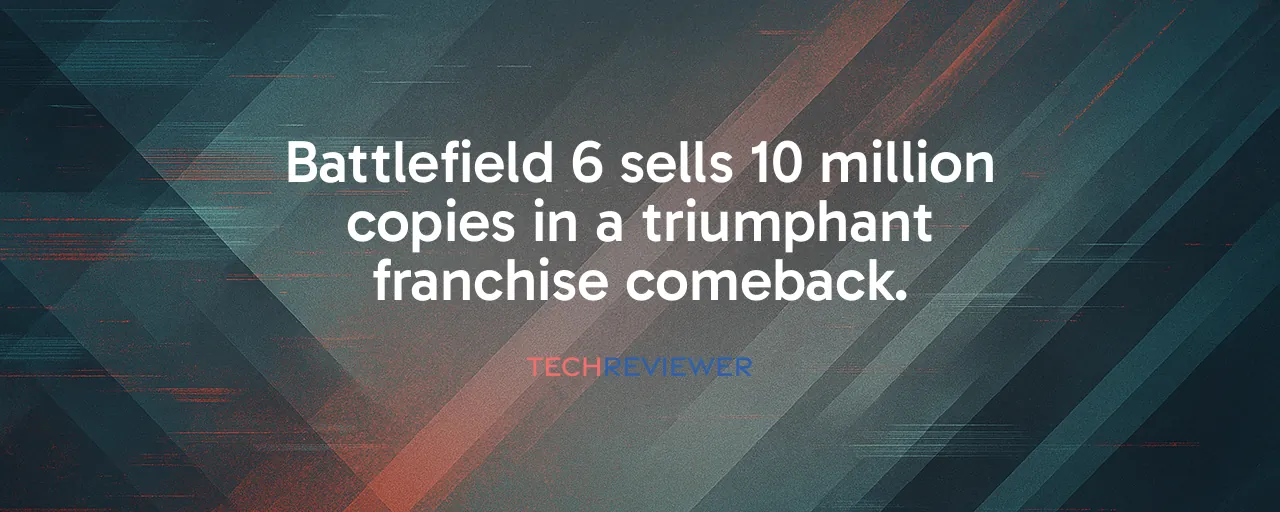A Comeback Worth Celebrating
Battlefield 6 has roared back to life, selling over 10 million copies across PlayStation 5, Xbox Series X/S, and PC platforms since its October 10, 2025 launch. For Electronic Arts and DICE, this milestone marks a triumphant return after the rocky reception of Battlefield 2042. The game's explosive debut, with 7 million copies sold in just three days, set a franchise record. By early November, Alinea Analytics confirmed the game had crossed the 10-million mark, driven largely by PC players on Steam, who account for 56.7 percent of sales. But what's fueling this surge? A return to the franchise's roots: massive maps, destructible environments, and polished vehicle combat that feels like the glory days of Battlefield 3 and 4.
Players have noticed the difference. The community buzzes with praise for dynamic battlefields where crumbling skyscrapers and collapsing bridges create unpredictable chaos. Unlike its predecessor, Battlefield 6 delivers smoother netcode and refined movement mechanics, like seamless slide-to-jump transitions. These fixes show EA listened to fans, addressing the desynchronization woes that plagued 2042. The game isn't perfect. Some players still report hit registration issues, with up to a third of shots failing to register in fast-paced scenarios. Despite these hiccups, the game's 747,440 peak concurrent players on Steam signal a level of engagement that surpasses Call of Duty's previous peak on the same platform.
The Call of Duty Juggernaut
While Battlefield 6 basks in its comeback, Activision's Call of Duty Black Ops 7 looms large, launching on November 14, 2025. Call of Duty's grip on the shooter market remains ironclad, especially on consoles, where PlayStation 5 and Xbox Series X/S players make up the bulk of its sales. According to Alinea Analytics' Rhys Elliott, Call of Duty benefits from a loyal player base that often purchases each annual release out of habit. This group, far larger than Battlefield's audience, keeps Activision ahead, even as some fans grumble about repetitive gameplay and flashy cosmetics borrowed from Fortnite's playbook.
Call of Duty's secret weapon is Warzone, its free-to-play battle royale. By weaving premium titles into Warzone's ecosystem, Activision ensures millions of players see in-game ads and social tie-ins daily, turning casual interest into sales. In contrast, Battlefield 6's free-to-play Redsec mode, launched post-release, has earned mixed reviews on Steam. While Redsec aims to mirror Warzone's model, it lacks the same marketing muscle. Data shows 56 percent of Battlefield 6 pre-purchasers also plan to buy Black Ops 7, while few Call of Duty players show similar interest in Battlefield. This one-way loyalty underscores Activision's console stronghold, where social networks and platform familiarity keep players hooked.
Lessons From the Battleground
Battlefield 6's success on Steam offers a masterclass in rebuilding trust. After Battlefield 2042's missteps, EA and DICE doubled down on community feedback, delivering over 260 fixes in the day-one patch and refining core mechanics like hit registration and vehicle spawns. The result? A peak of 172 million multiplayer matches played in the launch weekend and 15 million hours streamed on platforms like Twitch. The Portal system, letting players craft custom modes, hit capacity limits as fans created everything from classic Battlefield remakes to quirky experiments. This community focus paid off, with daily active Steam users holding steady at 2.3 to 2.5 million, defying the usual post-launch drop-off.
Call of Duty's Warzone integration, meanwhile, shows the power of ecosystem marketing. By embedding premium game promotions into a free-to-play title, Activision keeps players engaged year-round, ensuring Black Ops 7's launch will likely outpace Battlefield 6's sales. Warzone's approach isn't flawless. Its reliance on cosmetic-heavy monetization has sparked criticism for diluting the series' gritty identity. Both cases highlight a broader truth: in a 72.68-billion-dollar shooter market as of 2024, with projections to reach 192.9 billion by 2032, success hinges on balancing community goodwill with smart business moves. Battlefield 6 proves redemption is possible, but Call of Duty's entrenched habits make it a titan that's tough to topple.
What's Next for the Shooter Showdown
Battlefield 6's momentum depends on its post-launch plans. EA has outlined three content phases for Season 1, from October to December 2025, bringing new maps, weapons, and modes like Rogue Ops and Winter Offensive. These updates, paired with ongoing netcode tweaks, aim to keep players engaged. The Portal system's community servers could also drive long-term interest, provided EA curbs exploits like XP farming without stifling creativity. If Redsec gains traction, it might pull more players into Battlefield's orbit, especially on PC, where the game already dominates.
For Call of Duty, the challenge is maintaining its edge without alienating fans. Black Ops 7's success will likely ride on Warzone's marketing and console loyalty, but Activision must address gripes about repetitive content. The broader shooter market, projected to hit 15 billion dollars by 2035, rewards franchises that evolve. Battlefield 6's focus on player-driven innovation and Call of Duty's knack for ecosystem dominance offer contrasting blueprints. For players, the real win is a rivalry that pushes both series to deliver better experiences, whether through crumbling cityscapes or relentless marketing muscle.
